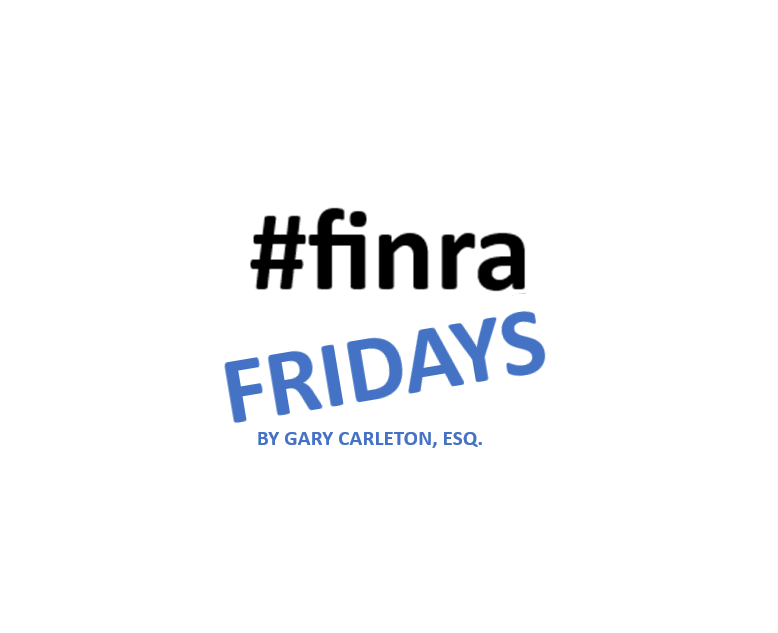

Welcome to #finraFridays!
This Blog breaks down the mysteries of FINRA’s Conduct Rules, and its investigative and disciplinary process so that those of you who are facing scrutiny by the regulator are better prepared to defend yourself. In each posting, we explore a rule or small piece of the process and explain how it impacts FINRA and you. If you want a topic covered on #finraFridays, feel free to contact Gary Carleton at gary@carletonlaw.net.
This Week:
FINRA’s Recent Regulatory Notice on Forgeries
Does Not Go Far Enough
FINRA recently published Regulatory Notice 22-18 in which it observed receiving “an increasing number of reports regarding registered representatives and associated persons … forging or falsifying customer signatures, and in some cases signatures of colleagues or supervisors through third-party digital signature platforms.” And while the emphasis of the Notice had to do with how to properly manage abuse of digital signatures, it left the false impression that violations occur only when such signatures are unauthorized.
According to the Notice:
Signing someone else’s name to a ocument violates FINRA rules when it is a forgery or falsification. Forgery occurs when one person signs or affixes or causes to be signed or affixed, another person’s name or initials on a document without the other person’s prior permission.
Forgery and falsification are violations of FINRA Rule 2010.
And while such acts of signing someone’s name without prior permission does violate FINRA Rule 2010, it fails to mention that a broker who signs a customer’s signature regardless of whether he signed the customer’s signature as an accommodation has also been found to violate Rule 2010.
In more than 30 years of working with FINRA’s disciplinary hearing and appellate processes, from the inside as a Senior Counsel in FINRA’s Enforcement Department, as a FINRA Hearing Officer, and now as a defense counsel, have seen just about every kind of case that FINRA brings.
In 2005, NASD Enforcement filed a complaint against Kirlin Securities, its two co-CEOs and head trader alleging a manipulation of Kirlin Holding stock (KILN) on the Nasdaq National Market.[1] One of the additional charges against co-CEO Anthony J. Kirincic was that he forged customer signatures on stock certificates and letters of authorization forms in furtherance of the manipulative scheme, a separate violation of NASD Rule 2110 (now FINRA 2010).
Kirincic initially claimed that the customers involved, who happen to be his own parents, signed the forms themselves. The stock certificates he signed accounted for more than 465,000 shares of KILN, which he sold and thereafter transferred $325,000 from his parents’ account to that of his sister, which he was using to purchase KILN stock.
Although the signatures in question do not bear any evidence that anyone other than the actual owners signed the forms, Kirincic eventually admitting that he signed the forms, but with the authority of, and as an accommodation to his parents. On this issue, the Commission held that Kirincic had violated NASD Rule 2110, “regardless of whether Kirincic’s parents authorized him to sign the documents at issue.”[2]
The Commission reasoned here that since NASD Rule 2110 requires its members to “observe high standards of commercial honor and just and equitable principles of trade … conduct may violate Rule 2110 if it is ‘unethical’ or committed in ‘bad faith.’”[3]
In this case, the Commission found that Kirincic had acted unethically, citing:
- The firm’s own internal compliance policies forbid brokers from signing documents as an accommodation to clients, requiring instead that all documents be completed by customers themselves; and
- Kirincic’s signing of the forms “were not merely an innocent administrative convenience but rather facilitated Kirincic’s manipulative transactions.”
Further explaining its ruling, the Commission noted that “FINRA’s authority to enforce its rules ‘is independent of a customer’s decision not to complain.”[4]
Finally, the Commission found that signing a customer’s name or initials to a document can violate NASD Rule 2110 “not only where the misconduct defrauds a customer but also where it otherwise benefits the wrongdoer.”[5]
FINRA’s Sanction Guidelines for Forgery, Unauthorized Use of Signatures, or Falsification of Records provides a wide range of potential sanctions ranging from a potential bar when aggravating factors predominate, to as little as 10 business days to six months where significant mitigating factors predominate. (See the Sanction Guidelines on page 97 at https://www.finra.org/sites/default/files/Sanctions_Guidelines.pdf.)
Conclusion
Most securities firms forbid brokers from ever signing a customer’s signature, even when authorized or as a “convenience” as that practice is fraught with so many opportunities for abuse and misunderstanding. In situations where, as demonstrated in the Kirlin matter, the broker signed his parent’s names on account documents in furtherance of his attempt to manipulate stock prices, the broker will be found to have violated FINRA Rule 2010 whether or not the broker was authorized to sign the customer’s name. Firms should emphasize to its brokers the importance of never allowing brokers to sign on behalf of their clients.
Gary Carleton focuses his practice representing individuals and firms facing FINRA investigations and disciplinary proceedings and appeals. He also serves as co-counsel with attorneys who have clients facing a FINRA investigation or disciplinary proceedings Contact Gary Carleton at 202.744.6297 or gary@carletonlaw.net to set up an initial consultation.
In Case You Missed It – You can find prior blogs on the FINRA investigative and disciplinary process at www.carletonlaw.net and go to the Blog tab. #finraFlashback blogs in which we discuss notorious FINRA disciplinary proceedings can also be found at www.carletonlaw.net.
The prior topics include:
* Guarding Against Excessive Trading in a Customer’s Account
https://carletonlaw.net/guarding-against-excessive-trading-in-a-customers-account/
* Keeping Stockbrokers Out of Trouble by Updating Their FINRA Form U4 Filings
https://carletonlaw.net/keeping-stockbrokers-out-of-trouble-by-updating-their-finra-form-u4-filings/
* Why FINRA’s Disciplinary Decisions are so “Appealing”
https://carletonlaw.net/why-finras-disciplinary-decisions-are-so-appealing/
* FINRA Flashback – FINRA’s Investigation Uncovers Stock Manipulation
https://carletonlaw.net/finra-flashback-finras-investigation-uncovers-stock-manipulation/
* FINRA Flashback to Stratton Oakmont
https://carletonlaw.net/finra-flashback-to-stratton-oakmont/
* Where have all the FINRA Members (and disciplinary actions) gone?
https://carletonlaw.net/where-have-all-the-finra-members-and-disciplinary-actions-gone/
* Special Considerations for Small Firms when Negotiating Settlements with FINRA
* Receiving that First Request for Information (a Rule 8210 Request)
https://carletonlaw.net/receiving-that-first-request-for-information-a-rule-8210-request/
* Pre-Wells Notices – An Early Opportunity to Discover FINRA’s Evidence and Present Your Case
* Understanding the Significance of FINRA’s Limited Jurisdiction;
https://carletonlaw.net/315-2/ and
* How Old is Too Old for a FINRA Disciplinary Action
https://carletonlaw.net/how-old-is-too-old-for-a-finra-disciplinary-action/
About Carleton Law PLLC
Getting a call from FINRA or SEC Enforcement telling you that your work as a securities broker is under investigation could be the worst day of your life. You have worked hard for years building your business. Now, with one wrongful allegation you can see it all swept away. But with expert counsel, it does not have to end that way.
For more than 30 years, Gary Carleton was the attorney conducting those investigations at FINRA and SEC and now his firm, Carleton Law PLLC, brings that savvy experience to bear to advocate for brokers and FINRA firms who find themselves in that dreaded position. Carleton Law focuses on the individual needs of each client to guide them through the maze of the investigative and disciplinary process.
Carleton Law PLLC | 2001 Massachusetts Avenue NW, Washington, DC 20036 | info@carletonlaw.net
The information provided in this article does not, and is not intended to, constitute legal advice; instead, all information is for general informational purposes only. Readers of this article should contact their attorney to obtain advice with respect to any particular legal matter. No reader should act or refrain from acting on the basis of information contained herein without first seeking legal advice from counsel in the relevant jurisdiction. Only your individual attorney can provide assurances that the information contained herein – and your interpretation of it – is applicable or appropriate to your particular situation. Use of, and access to, this article does not create an attorney-client relationship between the reader or user and the article author or law firm.
Attorney Advertising – Gary Carleton, Principal of Carleton Law, is admitted to practice law in the State of New York and the District of Columbia. This article may be considered attorney advertising.
[1] https://www.finra.org/sites/default/files/fda_documents/EAF0400300001_FDA_JM993036%20%282019-1563252560150%29.pdf
[2] Kirlin Securities, Inc. etal, Exchange Act Rel. No. 61135 (Dec. 10, 2009), at p. 26
[3] Id.
[4] Kirlin Securities at fn. 93.
[5] Citing Geoffrey Ortiz, Exchange Act Rel. No. 58416 (Aug. 22, 2008), SEC Docket 8977
